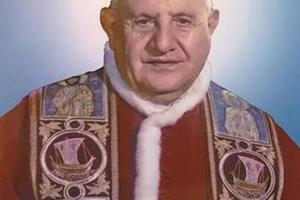John Paul’s Kingdom of Mercy
User's Guide to Sunday, April 27

Sunday, April 27, is the Second Sunday of Easter — Divine Mercy Sunday (Year A, Cycle II).
Mass Readings
Acts 2:42-47; Psalm 118:2-4, 13-15, 22-24; 1 Peter 1:3-9; John 20:19-31
Our Take
On this, his canonization day, what would St. John Paul II want us to gain from the readings?
He would want us to see that this week is a culmination of God’s kingdom — and that everything resolves in mercy.
After Holy Week and Easter Week — after the Last Supper, the Crucifixion and the Resurrection — today, the Second Sunday of Easter, we see how the life, death and passion of Jesus Christ brings the kingdom of God into our own lives when he breathes on the apostles and gives them the power to forgive sins.
In announcing the Third Luminous Mystery, John Paul II said the following:
"Another mystery of light is the preaching by which Jesus proclaims the coming of the kingdom of God, calls to conversion (Mark 1:15) and forgives the sins of all who draw near to him in humble trust (Mark 2:3-13; Luke 7:47-48): the inauguration of that ministry of mercy which he continues to exercise until the end of the world, particularly through the sacrament of reconciliation, which he has entrusted to his Church (John 20:22-23)."
The Scripture references there are important. In the first reference, Jesus says that the kingdom is now: "This is the time of fulfillment. The kingdom of God is at hand. Repent, and believe in the Gospel."
The next two references show how the kingdom comes about: through the forgiveness of sins. First, he cites the story of the men who lower their friend through the roof of a house to get to Jesus. Second, he cites the story of Jesus forgiving the sinful woman in the Pharisee’s house.
Which brings us to the Holy Father’s third Scripture reference: today’s Gospel.
From the beginning of his ministry, Jesus has said that we need forgiveness; he has associated the kingdom with his mercy. Now, the kingdom has truly come, in the Church, which gives us each access to forgiveness.
Forgiveness is the key to happiness.
And so it all comes down to confession. Confession is the only sacrament that Christ instituted in his resurrected life, and it is appropriate that he did so then.
Through it, he gives us the means to apply the graces of his dying and rising to ourselves; and when we emerge from the confessional, we have a miniature resurrection of our own.
We think St. John Paul II would agree.
Tom and April Hoopes write from Atchison, Kansas,
where Tom is writer in residence at Benedictine College.
- Keywords:
- April 20-May 3, 2014

















